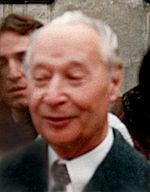Alexander Dubček, Date of Birth, Place of Birth, Date of Death
TweetAlexander Dubček
first Secretary of the Czechoslovak Communist Party
 Date of Birth: 27-Nov-1921
Date of Birth: 27-Nov-1921
 Place of Birth: Uhrovec, Trenčín Region, Slovakia
Place of Birth: Uhrovec, Trenčín Region, Slovakia
Date of Death: 07-Nov-1992
Profession: politician, diplomat, Esperantist
Zodiac Sign: Sagittarius 
About Alexander Dubček
- Alexander Dubcek (Slovak pronunciation: ['al?ksand?r 'dupt??k]; 27 November 1921 – 7 November 1992) was a Czechoslovak and Slovak politician who served as the First Secretary of the Presidium of the Central Committee of the Communist Party of Czechoslovakia (KSC) (de facto leader of Czechoslovakia) from January 1968 to April 1969.
- He attempted to reform the communist government during the Prague Spring but was forced to resign following the Warsaw Pact invasion in August 1968. During his leadership, under the slogan of "Socialism with a human face", Czechoslovakia lifted censorship on the media and liberalized Czechoslovak society, fuelling the so-called New Wave in Czechoslovak filmography.
- However, he was put under pressure by Stalinist voices inside the party as well as the Soviet leadership, who disliked the direction the country was taking and feared that Czechoslovakia could loosen ties with the Soviet Union and become more westernized.
- As a result, the country was invaded by the other Warsaw Pact countries on 20–21 August 1968, effectively ending the process known as the Prague Spring.
- Dubcek resigned in April 1969 and was succeeded by Gustáv Husák, who initiated normalization.
- Dubcek was then expelled from the Communist Party in 1970. Later, after the overthrow of the communist regime in 1989, he was Chairman of the federal Czechoslovak parliament.
- Also in 1989, the European Parliament awarded Dubcek the Sakharov Prize for Freedom of Thought.
Read more at Wikipedia
See Also
- Famous People's Birthdays on 27 November, Slovakia
- Famous People's Birthdays in November, Slovakia
- Famous politician's Birthdays on 27 November, Slovakia
- Famous politician's Birthdays in November, Slovakia
- Famous diplomat's Birthdays on 27 November, Slovakia
- Famous diplomat's Birthdays in November, Slovakia
- Famous Esperantist's Birthdays on 27 November, Slovakia
- Famous Esperantist's Birthdays in November, Slovakia

